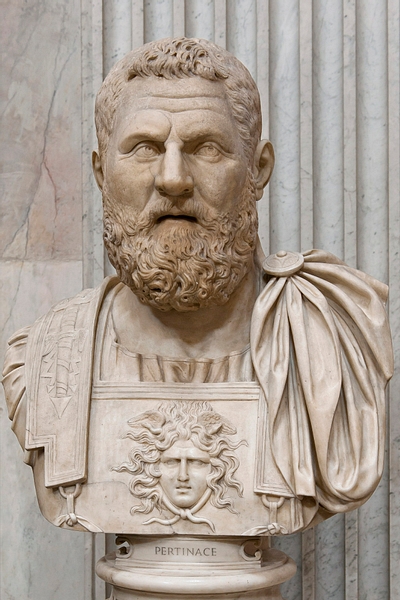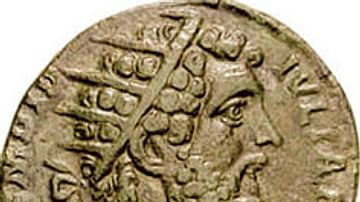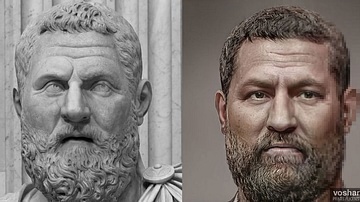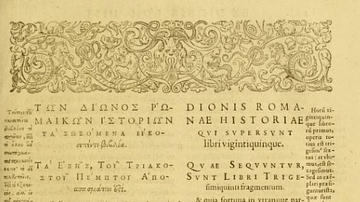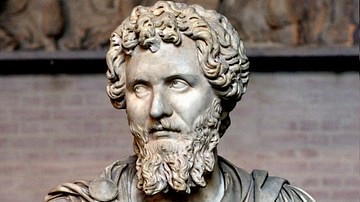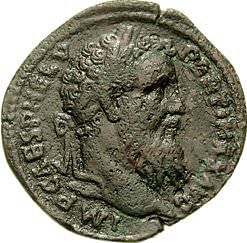
Pertinax was Roman Emperor for three months in 193 CE and, as successor to Commodus, it was hoped that he would restore much needed sobriety to the office of emperor. However, the former teacher, as well as putting in order the affairs of state, also embarked on a series of state spending cuts which led to his general unpopularity and eventual downfall at the hands of the Praetorian Guard.
After the assassination of Roman Emperor Commodus on December 31, 192 CE, the empire's throne was left vacant. As in the past - such as in the death of Emperor Caligula - the choice of a successor fell to the Praetorian Guard. Since there were no familial candidates, they chose a former teacher and military commander, Publius Helvius Pertinax. Unfortunately, his lack of skill in appeasing those around him (such as the Senate, the Guard, and the citizenry) would bring about his demise. After only eighty-seven days on the imperial throne, he would be dead. In his Roman History, Cassius Dio wrote, “Pertinax was as excellent and upright man, but he ruled only a very short time, and was then put out of the way by the soldiers.”
Early Life
Pertinax was born on August 1, 126 CE at Alba Pompeia in Liguria to a freed slave Helvius Successus; his mother's name is unknown. He led a truly 'rags to riches' story as his father went from slavery to success and wealth in the wool trade, allowing his son to receive a classical education which, in turn, permitted Pertinax to lead a quiet and uneventful life as a teacher of grammar. However, in 161 CE, at the age of thirty-five, he tired of the low pay and left teaching to enter the military.
Although he had no previous military experience, his education and family's money granted him the luxury of becoming the commander of a small legion of Gallic soldiers in Syria. His unique ability as a leader did not go unnoticed by those around him, and he quickly became a tribune stationed at York. Later, he fought alongside the future emperor Marcus Aurelius on the Danube frontier. Despite some early friction, his close ties to Marcus Aurelius eventually helped him become a senator, a consul in 175 CE, the governor of Dacia and later Syria in 181 CE, and prefect of Rome in 189 CE.
Assassination of Commodus
The assassination of Emperor Commodus brought both panic and bloodshed to the city. After the removal of the emperor's body (it was later interred in Hadrian's Mausoleum), Laetus, the commander of the Praetorian Guard and one of the conspirators in Commodus's death, and Electus, chamberlain to Commodus, made their way to the home of Pertinax and offered him the throne. Realizing he needed to ensure the Guard's support, Pertinax hurried to the Praetorian Guard's camp where he guaranteed each soldier a bonus of 12,000 sesterces. From there, Pertinax went to meet the Senate in the middle of the night. It was there that the now-deceased Commodus was condemned and Pertinax was proclaimed emperor - but this acceptance would soon turn to dismay and disgust.
The excesses of Commodus had come to an end as the finances of the empire were now in ruin. Cassius Dio wrote, “… he (Pertinax) at once reduced to order everything that had previously been irregular and confused; for he showed not only humaneness and integrity in the imperial administration, but also the most economical management and the most careful consideration for the public welfare.” To begin with, he reduced the extravagances that had been awarded the Guard by Commodus. Although he was eventually able to give the Guard the bonuses he had promised, he would never win their loyalty. Even provincial governors failed to support their new emperor; the madness of Commodus had taught them to be cautious of whoever sat on the throne.
Pertinax as Emperor
To rebuild the empire's finances - and pay the Guard their bonuses - he sold everything he could; he cleaned house. He even accused one palace official of embezzlement. Cassius Dio wrote, he “raised money as best he could from the statues, the arms, the horses, the furniture, and the favourites of Commodus, and gave the Praetorian all that he had promised ….” While the public was initially pleased (at least until he reduced the number of gladiatorial games), the Guard and the palace officials were not. Pertinax and his reign were in danger. He had simply tried too much, too soon.
With the emperor away at Ostia inspecting a grain shipment, an assassination plot by a Praetorian Guard member, Quintas Sosius Falco, was exposed. Falco was pardoned - it became apparent that he had been set up - but several others involved were executed. With each passing day, the Praetorian Guard grew more and more displeased with Pertinax. On March 28, 193 CE, three-hundred guards stormed the palace gates with little resistance. Although Pertinax was told to leave by his chamberlain Electus, he chose instead to stay and face the guard. Even though he tried to reason with them, his words fell on deaf ears; he and Electus were both stabbed to death. As one of the guards plunged his sword into Pertinax, he said, “The soldiers have sent you this sword.”
In conclusion, the emperor's time on the throne had been a disaster, for he had been too harsh and too much of an authoritarian. As with many before him, his head was cut off, placed on a pole, and paraded through the streets of Rome. With no apparent successor, the throne was once again left vacant. Pertinax would be the first of what became known as the Year of the Five Emperors. The empire was thrown into a civil war, and it would be four years before the dust would clear.

